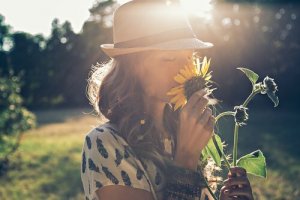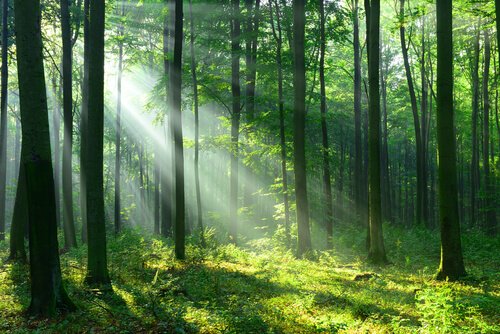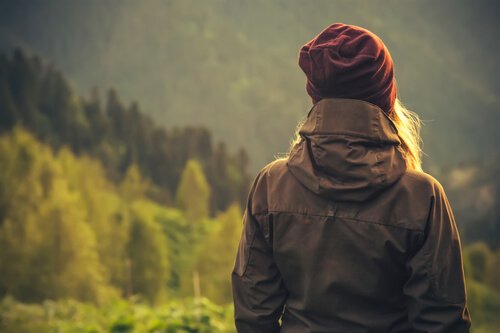Why We Need Contact with Nature after Home Confinement

Making contact with nature is almost a vital necessity due to the fact that we’ve spent so many weeks in confinement. Children, adults, and the elderly benefit from this closeness to nature in the countryside or the mountains. They enjoy the wind rustling through the leaves and rays of the sun bringing vitality, health, spirit, and hope. Our physical and mental health needs this primordial scenario more than ever.
Some people undoubtedly have been able to do this. Living near the country or the sea is a wonderful advantage for the senses. However, due to restrictions in certain countries, many still haven’t been able to and are still confined within urban areas and in small apartments.
The psychological impact of these conditions is often very debilitating and can greatly increase the levels of stress and anxiety.
When we live surrounded by four walls with a window that only connects us to a road, a shopping area, or any other city scenario, it produces the same mental exhaustion that a prisoner suffers. A mind that’s surrounded by this canvas of monotonous grays day after day ends up having memory lapses and mood swings.
People aren’t made for this kind of continuous confinement. One of the things that human beings miss most in these conditions is to feel the embrace of nature.
“There are moments when all anxiety and stated toil are becalmed in the infinite leisure and repose of nature.”
-Henry David Thoreau-

Making contact with nature, a need more than a desire
Nadine Nadkarni, a psychologist from the University of Utah in Salt Lake City, conducted an interesting experiment in 2010 at the River Snake Correctional Institution in Oregon. At this facility, aggression, violence, and high levels of anxiety and stress were common among the inmates. So, they had to devise a strategy to improve their coexistence.
The results of this study were published in the journal Nature. It’s still a point of reference in the field of psychology in correctional institutions. What Dr. Nadkarni thought up was to place images of natural environments in the cells. Furthermore, in the area of solitary confinement, they placed screens that showed videos of forests, rivers, and seas.
The results were highly positive. The anxiety levels went down, and the prison set up rooms where inmates could go to watch those videos for 45 minutes and, thus, lift their spirits and improve their mood. All this shows us how nature has a cathartic impact on human beings and how it can influence our physical and mental well-being.
However, people don’t only benefit from seeing pictures or videos of a forest or river. What we also need is to make contact with nature. Especially if we’ve spent several weeks in confinement because of the current pandemic.
Our brains need the blue of the sky and the green of the countryside
Pablo Picasso used to say that colors are the reflection of emotions printed on nature. It seems he was right. When people find themselves in an enclosed space, their eyes and minds are drawn to the window to find the blue of the sky. When they glimpse it, they experience peace.
Psychologists Joanne K. Garrett and Mathew P. White, from the University of Exeter Medical School in London, conducted a study and discovered something very interesting. People who live near the sea or in the countryside enjoy, on average, better physical and psychological health.
The colors in these settings and the sunlight reduce anxiety disorders and even improve older people’s health. Moreover, Marc Berman, a psychologist at the University of Michigan and an expert in the study of ecological psychology, suggests that the green color of the natural world has a positive effect on the brain. And the effect is almost immediate.

How do we make contact with nature if we’re still confined?
We need it. We long to make contact with nature. Its smell, and the warm light of the sunrises and sunsets… We long to tread the ground to discover its hidden treasures and feel the wind rustling through the branches, caressing our skin, and filling our lungs with oxygen.
However, many communities are still confined. Many adults, children, and senior citizens still can’t travel to the countryside or to the sea if they live in urban areas. What can they do in these cases?
Here are some simple strategies that you can use:
- On YouTube, you can watch relaxing videos set in wonderful natural settings.
- Google offers you resources to travel to so many different places around the world through your mobile or computer screens. You can visit natural reserves, islands, forests, mountains, and protected parks. The list is endless!
- Hanging pictures and posters of natural scenes on the walls of your house is also relaxing.
- Also, you can relax by putting on sounds of nature, such as trickling streams, the songs of the birds, or the waves of the sea.
Last but not least, remember the importance of receiving sunlight for at least 20 minutes a day. If you can’t go out, then being near a window or spending time on a balcony or terrace is essential for your physical and psychological health. The blue sky and the sunlight will give you energy and improve your mood.
Nature is always waiting for you with open arms. It won’t be long before you can embrace it again!
Making contact with nature is almost a vital necessity due to the fact that we’ve spent so many weeks in confinement. Children, adults, and the elderly benefit from this closeness to nature in the countryside or the mountains. They enjoy the wind rustling through the leaves and rays of the sun bringing vitality, health, spirit, and hope. Our physical and mental health needs this primordial scenario more than ever.
Some people undoubtedly have been able to do this. Living near the country or the sea is a wonderful advantage for the senses. However, due to restrictions in certain countries, many still haven’t been able to and are still confined within urban areas and in small apartments.
The psychological impact of these conditions is often very debilitating and can greatly increase the levels of stress and anxiety.
When we live surrounded by four walls with a window that only connects us to a road, a shopping area, or any other city scenario, it produces the same mental exhaustion that a prisoner suffers. A mind that’s surrounded by this canvas of monotonous grays day after day ends up having memory lapses and mood swings.
People aren’t made for this kind of continuous confinement. One of the things that human beings miss most in these conditions is to feel the embrace of nature.
“There are moments when all anxiety and stated toil are becalmed in the infinite leisure and repose of nature.”
-Henry David Thoreau-

Making contact with nature, a need more than a desire
Nadine Nadkarni, a psychologist from the University of Utah in Salt Lake City, conducted an interesting experiment in 2010 at the River Snake Correctional Institution in Oregon. At this facility, aggression, violence, and high levels of anxiety and stress were common among the inmates. So, they had to devise a strategy to improve their coexistence.
The results of this study were published in the journal Nature. It’s still a point of reference in the field of psychology in correctional institutions. What Dr. Nadkarni thought up was to place images of natural environments in the cells. Furthermore, in the area of solitary confinement, they placed screens that showed videos of forests, rivers, and seas.
The results were highly positive. The anxiety levels went down, and the prison set up rooms where inmates could go to watch those videos for 45 minutes and, thus, lift their spirits and improve their mood. All this shows us how nature has a cathartic impact on human beings and how it can influence our physical and mental well-being.
However, people don’t only benefit from seeing pictures or videos of a forest or river. What we also need is to make contact with nature. Especially if we’ve spent several weeks in confinement because of the current pandemic.
Our brains need the blue of the sky and the green of the countryside
Pablo Picasso used to say that colors are the reflection of emotions printed on nature. It seems he was right. When people find themselves in an enclosed space, their eyes and minds are drawn to the window to find the blue of the sky. When they glimpse it, they experience peace.
Psychologists Joanne K. Garrett and Mathew P. White, from the University of Exeter Medical School in London, conducted a study and discovered something very interesting. People who live near the sea or in the countryside enjoy, on average, better physical and psychological health.
The colors in these settings and the sunlight reduce anxiety disorders and even improve older people’s health. Moreover, Marc Berman, a psychologist at the University of Michigan and an expert in the study of ecological psychology, suggests that the green color of the natural world has a positive effect on the brain. And the effect is almost immediate.

How do we make contact with nature if we’re still confined?
We need it. We long to make contact with nature. Its smell, and the warm light of the sunrises and sunsets… We long to tread the ground to discover its hidden treasures and feel the wind rustling through the branches, caressing our skin, and filling our lungs with oxygen.
However, many communities are still confined. Many adults, children, and senior citizens still can’t travel to the countryside or to the sea if they live in urban areas. What can they do in these cases?
Here are some simple strategies that you can use:
- On YouTube, you can watch relaxing videos set in wonderful natural settings.
- Google offers you resources to travel to so many different places around the world through your mobile or computer screens. You can visit natural reserves, islands, forests, mountains, and protected parks. The list is endless!
- Hanging pictures and posters of natural scenes on the walls of your house is also relaxing.
- Also, you can relax by putting on sounds of nature, such as trickling streams, the songs of the birds, or the waves of the sea.
Last but not least, remember the importance of receiving sunlight for at least 20 minutes a day. If you can’t go out, then being near a window or spending time on a balcony or terrace is essential for your physical and psychological health. The blue sky and the sunlight will give you energy and improve your mood.
Nature is always waiting for you with open arms. It won’t be long before you can embrace it again!
This text is provided for informational purposes only and does not replace consultation with a professional. If in doubt, consult your specialist.







